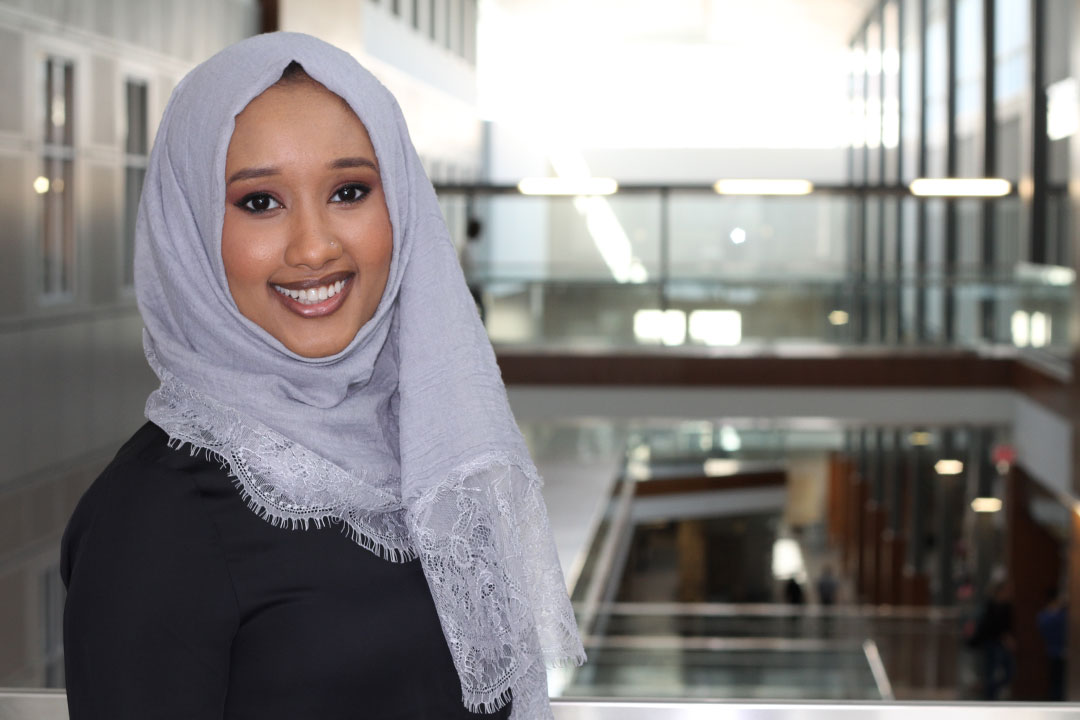
Master’s degree a family first for Absher
Before they came to Canada, Nafisa Absher’s family spent years moving through the Middle East in search of a home.
By HenryTye GlazebrookThough her upbringing was steeped in Somali culture, Absher and her siblings have never set foot in the country in which their roots lay. Instead, their formative years were spread across Saudi Arabia, Kenya and Syria before they were able to secure a permanent home in Canada.
And through it all, the then-13 year-old Absher gained a profound appreciation for the single mother who strained and toiled ceaselessly to give her children opportunities that she never had.
“My mom worked really hard to make sure that, even though things were difficult, we never felt like we were living in poverty or being discriminated against,” said the University of Saskatchewan master’s student. “She always made sure that we were comfortable and felt like we were at home.
“Now that I’m older and have talked to her, I’m realizing that the stuff she’s been through is beyond my mind. I feel so grateful for my mom to have gone through all that for us to be here, and for me to sit here today and say I’m getting my master’s and I’m the first woman in my family to attain post-secondary education.”
Absher’s family found a home in Regina, where she attended high school and earned a bachelor’s degree in psychology at the University of Regina. From there, she looked to the U of S as the place where she could pursue her master’s in the School of Public Health, without straying too far from the family she holds so dear. “I’ve always had a passion to improve the health of marginalized communities with an integrative approach, and I wanted to pursue a career that would enable me to address health inequities from a population level,” said Absher, who completed the Master of Public Health program this year and received her degree at spring convocation.
Coming from the U of R was difficult at first for Absher, who says the U of S proved a larger and more daunting school at the outset. Feeling that graduate students are often isolated from campus activities, Absher became involved with the Graduate Students’ Association (GSA) as a way of carving out a place on campus and helping to build community among fellow graduate students.
By her final year, Absher was helping lead the GSA as its vice-president operations and communications. This past year, Absher focused on the internal operations of the GSA, including the supervision of the staff, co-ordinating the GSA bursary selection process, overseeing the implementation of additional programs and services, and advocating for additional financial support for graduate students.
Absher recalls her final year of study fondly, when as the recipient of the Dr. James Rossiter MPH Practicum Award, she took on a 12-week placement with Health Canada’s First Nations and Inuit Health branch in Regina.
Absher said the experience was one of the highlights of her school year, as she conducted interviews to help build a framework for developing a comprehensive regional surveillance plan. The resulting data could then be used to empower Indigenous communities to improve and protect their own health and well-being.
“It really did reaffirm my passion for working with underserved communities and working in the area of health inequities, and doing it from the point of view of epidemiology and health policy,” she said.
These days, Absher is reflecting on the influence her mother’s experience has had on her upbringing, stretching from her beginnings a half a world away and through to her chosen career-path today.
“She makes me more passionate about the work that I’m in, and makes me want to work even harder to help people who are going through similar experiences and feel they don’t have a voice—to offer my support,” she said.

